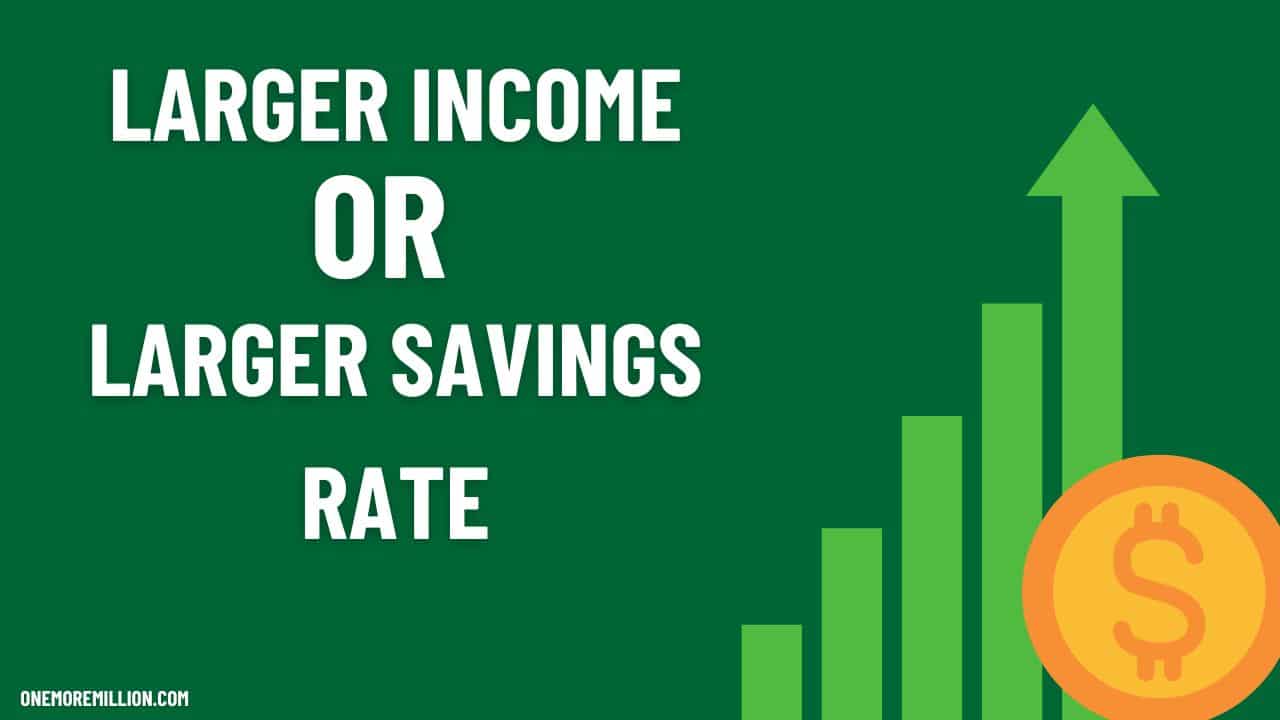In today’s world, the allure of a bigger salary often dominates conversations around personal wealth and financial independence. After all, who wouldn’t want a few extra zeroes in their monthly income? However, as many financially savvy individuals will attest, there’s another side to the coin. Beneath the glare of flashy income lies a silent, faithful ally to wealth accumulation—the savings rate. Understanding the dynamics between a bigger income and a larger savings rate can seem like deciphering a complex puzzle. Which holds the actual power to unlock the doors to a prosperous future? As we embark on this exploration, we’ll dissect the pros and cons of each and uncover the real essence of financial freedom. Buckle up for an enlightening journey into the heart of personal finance.
The Appeal of a Larger Income: More than Just Glitter and Glamour
Undeniably, a substantial income is often viewed as a direct passport to a better life. Society, movies, and even our peers regularly reinforce the notion that high earnings equate to success. But what exactly is it about a higher income that is so enticing? Let’s delve deeper into the undeniable charm of bigger paychecks:
- Enhanced Lifestyle Choices: A higher income typically grants you the freedom to upgrade your living conditions, opt for a more luxurious vehicle, dine at finer establishments, and indulge in premium experiences. These tangible improvements in lifestyle contribute significantly to our sense of well-being and status.
- Easier Debt Management: Whether it’s student loans, mortgages, or credit card bills, debts tend to weigh heavily on one’s mind. A larger income can expedite the process of settling these debts, providing relief from prolonged financial stress.
- Financial Security: With more funds coming in, you’re better equipped to handle unexpected financial challenges. Be it a sudden medical emergency, job loss, or urgent home repairs, a substantial income can act as a safety net, ensuring that such surprises don’t derail your finances.
- Opportunities for Investment: A significant income allows you to diversify and experiment with different investment avenues. From real estate to stocks or even starting a personal business venture, having additional funds provides the leverage to maximize your wealth through calculated risks.
- Enhanced Social Status: Like it or not, in many societies, income often dictates social standing. A higher income can increase respect, influence, and networking opportunities within your community and professional circles.
- Flexibility & Freedom: With more money at your disposal, you can make choices that might be inaccessible to others. This could be extended vacations, pursuing a hobby full-time, or even considering early retirement.
While the advantages are numerous, it’s essential to understand that a higher income also comes with challenges. These can range from increased responsibilities at work, higher tax brackets, or even the risk of lifestyle inflation—where your expenses rise with your income, leaving little to no savings.
The allure of a larger income is palpable, but as we’ll discover next, savings play a pivotal role in scripting your financial tale.
However, a Higher Income Has Its Pitfalls
Lifestyle Inflation
A fresh graduate, Raj, starts his first job with an entry-level salary. His expenses are minimal, mostly restricted to necessities. A few years pass, and Raj gets a promotion with a considerable salary bump. Suddenly, there’s room for that premium gym membership, dining in upscale restaurants, buying high-end smartphones, or moving to a fancier neighborhood. As Raj’s income rises, so do his expenses, often at a proportionally equal or even higher rate. This phenomenon is termed as ‘Lifestyle Inflation.’
While it’s natural to want better and more comfortable things as one’s disposable income increases, lifestyle inflation can pose serious challenges:
- Delayed Financial Goals: Raj might live paycheck to paycheck despite earning a lot if he spends every raise. This can delay other financial objectives like buying a home, investing, or planning for early retirement.
- Reduced Financial Flexibility: An inflated lifestyle can mean higher fixed monthly costs. This can make it difficult to adjust during financial downturns or if there’s a sudden need to reduce expenses, like during a job loss or global economic challenges.
- Misalignment with True Desires: Lifestyle inflation often brings with it societal pressures. Raj might buy things or opt for services more because of societal expectations than his desire or need.

The Higher Income Tax Implications
On the surface, a larger paycheck is always enticing. But as the ancient saying goes, “It’s not how much you earn; it’s how much you keep.” This becomes particularly relevant when we discuss tax implications associated with higher incomes.
In most tax systems, including India’s, tax rates are progressive. This means that as your income increases, the percentage of your income you pay as tax also goes up. For instance:
- Higher Tax Bracket: A significant salary hike can push an individual into a higher tax bracket, meaning a big portion of their income is taxed at a higher rate.
- Reduced Benefits and Deductions: Certain tax benefits or deductions are phased or reduced as income grows. This can further increase the effective tax rate for high earners.
- Capital Gains Impacts: For tech professionals, a part of their income might come from selling stocks or equity as compensation. Higher earners often have to be more strategic about when and how they sell these assets to manage the capital gains tax implications.
Balancing the Act
While a higher income can provide a more comfortable lifestyle and a sense of financial security, it’s essential to recognize and navigate the potential pitfalls of lifestyle inflation and increased taxation. Savvy individuals often consult with financial planners to optimize their income, minimize tax liabilities, and ensure they save and invest wisely, regardless of how much they earn. It’s about creating a balance where income and savings go hand in hand, ensuring a prosperous and secure future.
The Power of a Larger Saving Rate: Why Every Penny Saved Matters
While the shine of a bigger paycheck is often hard to resist, the true backbone of financial independence lies in how much you can save and invest, not just how much you earn. A higher saving rate amplifies your financial potential in counterintuitive ways. Let’s unravel the manifold strengths of prioritizing savings:
- Compounding Magic: The principle of compound interest, often dubbed the world’s eighth wonder, works most favorably when given time. By starting to save and invest early, even if it’s a modest amount, you harness the full potential of compound growth. Over years or decades, your savings can grow exponentially, turning your modest contributions into a significant sum.
- Freedom from Financial Stress: While a large income can undoubtedly cover many expenses, a robust saving habit ensures you’re cushioned against unforeseen circumstances. With ample savings, you’re not just living paycheck to paycheck, granting you peace of mind in volatile times.
- Achieving Goals Faster: Whether it’s buying a home, traveling the world, or early retirement, a higher saving rate can accelerate the realization of your dreams. By consistently setting aside a more substantial portion of your income, you build the necessary funds to achieve these milestones sooner than expected.
- Flexibility in Career Choices: A robust savings buffer can allow you to make career decisions based on passion rather than paychecks. Whether taking a sabbatical, shifting to a part-time role, or starting your venture, a higher saving rate provides the financial support to explore unconventional paths.
- Guard Against Lifestyle Inflation: A common pitfall of higher incomes is the proportional expenses increase—or lifestyle inflation. By committing to a higher saving rate, you inherently place a check on indiscriminate spending, ensuring that your lifestyle doesn’t erode your earnings.
- Generational Wealth Creation: A disciplined saving approach and wise investments can create wealth that transcends generations. By keeping more, you’re not just securing your future but potentially laying the foundation for your heirs’ financial well-being.
In essence, while a higher income can open doors to immediate gratifications and enhanced lifestyle choices, a larger saving rate is the key that unlocks long-term financial prosperity and stability. It’s the silent workhorse that, when nurtured, can outshine even the most impressive incomes.
Related Reading: Unraveling the Rule of 72: A Timeless Guide to Understanding Compound Interest
The Challenges with a High Savings Rate:
- Possibility of Over-frugality: It’s essential to strike a balance. Being too frugal can sometimes lead to missing out on life experiences or being overly stressed about spending.
- Diminishing Returns: After a certain point, cutting costs might become challenging without compromising the quality of life.
Related Reading: Budgeting for Success: How to Create a Budget Using the 50/30/20 Rule
Conclusion: Balancing Earning with Saving – The Ultimate Financial Mastery
In personal finance, the tug-of-war between earning more and saving more often occupies center stage. While both elements are pivotal to our financial narrative, understanding their unique strengths and roles is paramount.
A higher income undoubtedly offers immediate rewards—a more lavish lifestyle, increased societal standing, and easier access to luxury. It’s the very validation of our hard work and capabilities. But as the saying goes, “It’s not about how much you make, but how much you keep.” This is where the power of a robust saving rate, often overshadowed by the allure of larger paychecks, shines through.
A high saving rate doesn’t just represent numbers in a bank account; it symbolizes financial prudence, foresight, and discipline. It’s a testament to our ability to prioritize long-term gains over short-lived pleasures. By saving consistently and wisely, we craft a safety net, ensuring that the fruits of our labor are enjoyed momentarily and savored over lifetimes and even generations.
Moreover, as our world becomes increasingly unpredictable, having a cushion of savings bestows us a certain financial agility. It grants us the freedom to take calculated risks, change our life’s direction, or weather economic downturns with resilience.
In conclusion, while a hefty income is a powerful tool in the arsenal of financial growth, the art of saving and investing genuinely defines our financial journey’s trajectory. As we navigate the complexities of money matters, may we remember that earning is but one side of the coin, while saving, often quietly, completes the picture. Embracing both with equal enthusiasm is the cornerstone of true financial wisdom.
Frequently Asked Questions
A. While a 50% savings rate is commendable, it’s essential to tailor it based on individual incomes, expenses, and financial goals.
A. Consider upskilling, freelancing, or exploring passive income sources like investments or side businesses.
A. Stay budget-conscious, prioritize savings, and remind yourself of your long-term financial goals.
A. Starting with 20% is a good benchmark. Adjust this rate as your income grows or as you become more comfortable with saving.









